Mitali Perkins's Blog, page 20
April 27, 2013
2013 Jane Addams Children's Book Awards

JANE ADDAMS CHILDREN’S BOOK AWARDS ANNOUNCED
APRIL 27, 2013…
Recipients of the 2013 Jane Addams Children’s Book Awards were announced today
by the Jane Addams Peace Association. Since 1953, the Jane Addams Children’s Book Award annually acknowledges books published in the U.S. during the previous year. Books commended by the Award address themes or topics that engage children in thinking about peace, justice, world community and/or equality of the sexes and all races. The books also must meet conventional standards of literacy and artistic excellence.
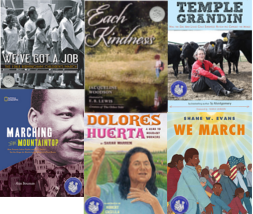
Each Kindness , written by Jacqueline Woodson, illustrated by E.B.
Lewis and published by Nancy Paulsen Books, an imprint of Penguin, is the
winner in the Books for Younger Children Category. We’ve Got a Job: The 1963
Birmingham Children’s March, written by Cynthia Levinson and published
by Peachtree Publishers, is the winner in the Books for Older Children
category.
Each Kindness Small actions, or the lack of them, can be haunting
as is the case for Maya and for Chloe in their rural elementary school. This
open-ended, profound tale created in free verse and sober watercolors glimpses
interactions between Chloe and Maya, the new girl arriving midyear in broken
sandals, before the teacher invites students to ponder their kindnesses.
We’ve Got a Job In 1963, four thousand young African American
students, from elementary through high school, voluntarily went to jail in one
of the most racially violent cities in America. Focusing on four of these
students, this photo essay recounts the riveting events throughout the
Children’s March.
Two books were named Honor
Books in the Books for Younger Children category.
Dolores Huerta: A Hero to Migrant
Workers , written by
Sarah Warren and illustrated by Robert Casilla, published by Marshall Cavendish
Children, has been named an Honor Book for Younger Children. In California in
the 1950s, teacher Dolores Huerta was concerned for her students. Learning the
conditions of the migrant families, Dolores became a determined activist who
fought for labor rights through her words and actions.
We March , written and illustrated by Shane W. Evans, and
published by Roaring Brook Press, a Neal Porter imprint of Macmillan, has been
named an Honor Book for Younger Children. Simple and powerful illustrations
capture the excitement and hope for even the youngest reader of the 1963 March
on Washington for Jobs and Freedom. The colorful crowd of 250,000 demonstrates
their strength and unity in marching to Martin Luther King’s historical speech
for racial equality.
Two
books were named Honor Books in the Books for Older Children category.
Marching to the Mountaintop: How
Poverty, Labor Fights and Civil Rights Set the Stage for Martin Luther King
Jr’s Final Hours , written by Ann
Bausum and published by National Geographic, is named an Honor Book for Older
Children. A long sanitation worker strike began in 1968 following the deaths of
two sanitation workers on the job sanitation workers in Tennessee. The strike
became part of the larger civil rights movement and brought Martin Luther King,
Jr. to Nashville to support the workers in their fight for for integration,
safety, better pay and union protection.
Temple Grandin: How the Girl Who Loved
Cows Embraced Autism and Changed the World by Sy
Montgomery, published by Houghton Mifflin Books for Children, is named an Honor
Book for Older Children. This biography
with much first person input from Ms. Grandin herself explains how her autistic
mind works, how her peers and family perceive her, and her relentless efforts
as an activist.
A national committee chooses winners and honor books
for younger and older children. Members of the 2012 Jane Addams Children’s Book
Award Committee are Marianne Baker (Chair, Barboursville, VA), Ann Carpenter (Harwich,
MA), Julie Olsen Edwards (Soquel, CA), Lauren Mayer (Seattle, WA), Beth McGowan
(DeKalb, IL), Sonja Cherry-Paul (Yonkers, NY), Tracy Randolph (Sewanee, TN),
Lani Gerson (Watertown, MA), Susan Freiss (Madison, WI), and Jacqui Kolar
(Chicago, IL). Regional reading and discussion groups of all ages participated
with many of the committee members throughout the jury’s evaluation and
selection process.
The authors and illustrators of the
2013 Jane Addams Children’s Book Awards will be honored on Friday, October 18, 2013 in New York City. Details about the award event and
about securing winner and honor book seals are available from the Jane Addams
Peace Association (JAPA.) Contact JAPA Executive Director Linda B. Belle,
777 United Nations Plaza, 6th Floor, NY, NY 10017-3521; by phone
212.682.8830; and by email japa@igc.org .
For
additional information about the Jane Addams Children’s Book Awards and a
complete list of books honored since 1953, see www.janeaddamspeace.org .
Come visit me on the Fire Escape!




Published on April 27, 2013 14:43
April 26, 2013
2013 South Asia Book Award for Children’s and YA Literature
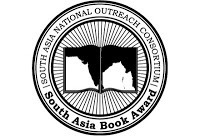
The South Asia Book Award, administered by the South Asia National Outreach Consortium, is given annually for up to two outstanding works of literature, from early childhood to secondary reading levels, which accurately and skillfully portrays South Asia or South Asians in the diasporas, that is the experience of individuals living in South Asia, or of South Asians living in other parts of the world. Up to five Honor Books and Highly Commended Books will also be recognized by the award committee for their contribution to this body of literature on the region.
2013 Winners
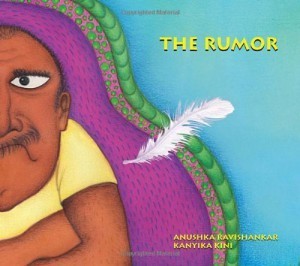 The Rumor by Anushka Ravishankar, illustrations by Kanyika Kini (Tundra Books, 2012). In the village of Baddbaddpur, the people like to tell tales. Pandurang is so dour that he can make milk turn sour. One day he coughs up a feather. As the story of Pandurang’s feather is passed from one person to another it grows and grows and grows until it can hardly be recognized. (Grades PreK-4).
The Rumor by Anushka Ravishankar, illustrations by Kanyika Kini (Tundra Books, 2012). In the village of Baddbaddpur, the people like to tell tales. Pandurang is so dour that he can make milk turn sour. One day he coughs up a feather. As the story of Pandurang’s feather is passed from one person to another it grows and grows and grows until it can hardly be recognized. (Grades PreK-4).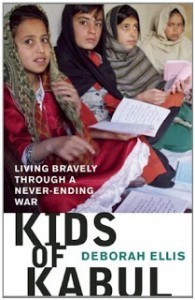 Kids of Kabul: Living Bravely Through a Never-Ending War by Deborah Ellis (Groundwood Books, House of Anansi Press, 2012). Deborah Ellis went to Kabul to find out what happened to Afghanistan’s children since the fall of the Taliban in 2001. She interviewed children who spoke about their lives. They are still living in a country torn apart by war, violence and oppression still exist, particularly affecting the lives of girls, but the kids are weathering their lives with courage and optimism. (Grades 5 – 12).
Kids of Kabul: Living Bravely Through a Never-Ending War by Deborah Ellis (Groundwood Books, House of Anansi Press, 2012). Deborah Ellis went to Kabul to find out what happened to Afghanistan’s children since the fall of the Taliban in 2001. She interviewed children who spoke about their lives. They are still living in a country torn apart by war, violence and oppression still exist, particularly affecting the lives of girls, but the kids are weathering their lives with courage and optimism. (Grades 5 – 12).2013 Honor Books
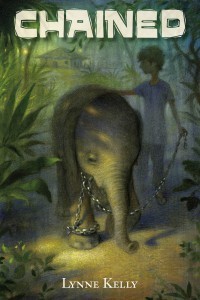 Chained
by Lynne Kelly (Farrar Straus Giroux, Margaret Ferguson Books, 2012). To work off a family debt, ten-year-old Hastin leaves his desert village in India to work as a circus elephant keeper but many challenges await him, including trying to keep Nadita, a sweet elephant, safe from the cruel circus owner. (Grades 4-7).
Chained
by Lynne Kelly (Farrar Straus Giroux, Margaret Ferguson Books, 2012). To work off a family debt, ten-year-old Hastin leaves his desert village in India to work as a circus elephant keeper but many challenges await him, including trying to keep Nadita, a sweet elephant, safe from the cruel circus owner. (Grades 4-7).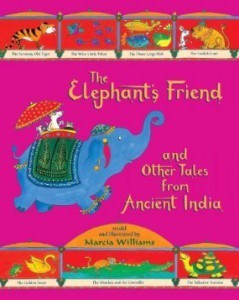 The Elephant’s Friend and Other Tales from Ancient India by Marcia Williams (Candlewick Press, 2012). Drawing from three books of best-loved Indian folktales — Hitopadesha Tales, Jataka Tales, and Panchantra Tales — this graphic storybook collection, alive with kid-friendly illustrations, is infused with humor and warmth. (Grades K-4).
The Elephant’s Friend and Other Tales from Ancient India by Marcia Williams (Candlewick Press, 2012). Drawing from three books of best-loved Indian folktales — Hitopadesha Tales, Jataka Tales, and Panchantra Tales — this graphic storybook collection, alive with kid-friendly illustrations, is infused with humor and warmth. (Grades K-4).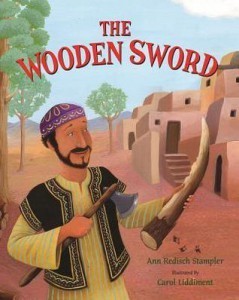 The Wooden Sword by Ann Redisch Stampler, illustrated by Carol Liddiment (Albert Whitman & Company, 2012). Disguised in servant’s clothes, an Afghani shah slips out of his palace to learn more about his people. When he encounters a poor Jewish shoemaker faithful that everything will turn out just as it should, the shah grows curious. Vowing that no harm will befall the poor man, he decides to test that faith. (Grades K-5).
The Wooden Sword by Ann Redisch Stampler, illustrated by Carol Liddiment (Albert Whitman & Company, 2012). Disguised in servant’s clothes, an Afghani shah slips out of his palace to learn more about his people. When he encounters a poor Jewish shoemaker faithful that everything will turn out just as it should, the shah grows curious. Vowing that no harm will befall the poor man, he decides to test that faith. (Grades K-5).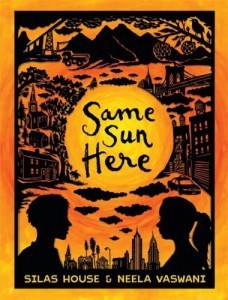 Same Sun Here
by Silas House and Neela Vaswani (Candlewick Press, 2012). A twelve-year-old Indian immigrant in New York City and a Kentucky coal miner’s son become pen pals, and eventually best friends, through a series of revealing letters exploring such topics as environmental activism, immigration, and racism. (Grades 4-7).
Same Sun Here
by Silas House and Neela Vaswani (Candlewick Press, 2012). A twelve-year-old Indian immigrant in New York City and a Kentucky coal miner’s son become pen pals, and eventually best friends, through a series of revealing letters exploring such topics as environmental activism, immigration, and racism. (Grades 4-7).2013 Highly Commended Books
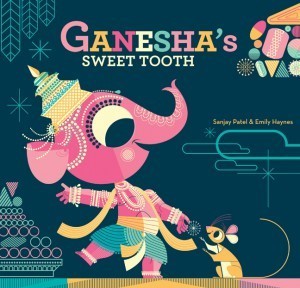 Ganesha’s Sweet Tooth
by Sanjay Patel and Emily Haynes (Chronicle Books, 2012). The bold, bright colors of India leap right off the page in this fresh and funny picture book adaptation of how Ganesha came to write the epic poem of Hindu literature, the Mahabarata. (Grades Prek-3)
Ganesha’s Sweet Tooth
by Sanjay Patel and Emily Haynes (Chronicle Books, 2012). The bold, bright colors of India leap right off the page in this fresh and funny picture book adaptation of how Ganesha came to write the epic poem of Hindu literature, the Mahabarata. (Grades Prek-3) Shadow
by Michael Morpurgo (Feiwel and Friends Book, an imprint of Macmillan, 2012). 14 year old Aman and his mother flee the horrors of war in Afghanistan and escape to England. But just as they are getting settled in their new home, Aman and his mother find themselves in a detention center. Their only hope is Aman’s friend Matt, Matt’s grandfather, and the dream of finding Shadow, Aman’s trusted and loyal canine companion. (Grades 5-8).
Shadow
by Michael Morpurgo (Feiwel and Friends Book, an imprint of Macmillan, 2012). 14 year old Aman and his mother flee the horrors of war in Afghanistan and escape to England. But just as they are getting settled in their new home, Aman and his mother find themselves in a detention center. Their only hope is Aman’s friend Matt, Matt’s grandfather, and the dream of finding Shadow, Aman’s trusted and loyal canine companion. (Grades 5-8).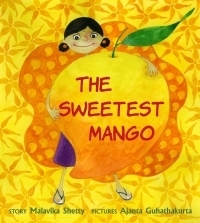 The Sweetest Mango
by Malavika Shetty, illustrations by Ajanta Guhathakurta (Tulika Publishers, 2012). The sweet, simple story and luscious pictures evoke delicious flavors of hot days, warm friendships and the smell of mango in the air. (Grades PreK-3)
The Sweetest Mango
by Malavika Shetty, illustrations by Ajanta Guhathakurta (Tulika Publishers, 2012). The sweet, simple story and luscious pictures evoke delicious flavors of hot days, warm friendships and the smell of mango in the air. (Grades PreK-3)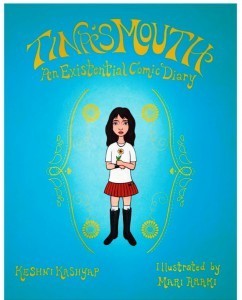 Tina’s Mouth: an Existential Comic Diary by Keshni Kashyap, illustrations by Mari Araki (Houghton Mifflin Harcourt, 2012). Tina Malhotra, a sophomore at the Yarborough Academy in Southern California, creates an existential diary for an assignment in which she tries to determine who she is and where she fits in. (Grades 9-12).
Tina’s Mouth: an Existential Comic Diary by Keshni Kashyap, illustrations by Mari Araki (Houghton Mifflin Harcourt, 2012). Tina Malhotra, a sophomore at the Yarborough Academy in Southern California, creates an existential diary for an assignment in which she tries to determine who she is and where she fits in. (Grades 9-12).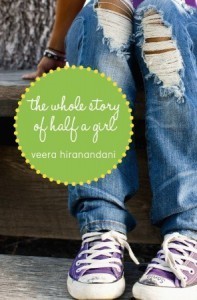 The Whole Story of Half a Girl by Veera Hiranandani (Delacorte Press, 2012). When Sonia’s father loses his job, she must move from her small, supportive private school to a public middle school. The new school, her father’s diagnosis of clinical depression, and her half- Jewish and half- Indian heritage leave Sonia feeling more confused about herself, her friends, and her family. Grades 5-8).
The Whole Story of Half a Girl by Veera Hiranandani (Delacorte Press, 2012). When Sonia’s father loses his job, she must move from her small, supportive private school to a public middle school. The new school, her father’s diagnosis of clinical depression, and her half- Jewish and half- Indian heritage leave Sonia feeling more confused about herself, her friends, and her family. Grades 5-8).
Congratulations to the winners!
Download the 2013 South Asia Book Award announcement.
Come visit me on the Fire Escape!




Published on April 26, 2013 10:32
April 18, 2013
PEN New England Susan P. Bloom Children's Book Discovery Award 2013
One of my favorite literary involvements in New England is serving on the Pen New England Susan P. Bloom Children's Book Discovery Award Committee. This year, I was delighted that two of my writing buddies,
Katherine T. Quimby
and
Anna J. Boll
, won the award.
The best entries were all about voice, and these two accomplished Vermont College graduates absolutely nailed their main characters' respective voices. If you're in the area, join us at Lesley University in Cambridge, MA on May 19 at 6:30 p.m. to hear the authors read their work, snack, schmooze, and celebrate children's books. Come visit me on the Fire Escape!




The best entries were all about voice, and these two accomplished Vermont College graduates absolutely nailed their main characters' respective voices. If you're in the area, join us at Lesley University in Cambridge, MA on May 19 at 6:30 p.m. to hear the authors read their work, snack, schmooze, and celebrate children's books. Come visit me on the Fire Escape!




Published on April 18, 2013 05:34
April 1, 2013
Farewell, New England. Hello, San Francisco Bay Area.
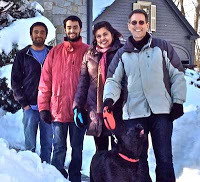 Maybe you've noticed that I haven't been as active on the Fire Escape or on social media lately. Here's why: after 12+ years in beautiful Boston, my husband was offered a new
job
and we're moving back to the San Francisco Bay Area this summer. We'll be living in the East Bay, close to my parents and sister and near
Saint Mary's College of California
, where our sons attend and where I've taught a course on children's books for the past two January terms.
Maybe you've noticed that I haven't been as active on the Fire Escape or on social media lately. Here's why: after 12+ years in beautiful Boston, my husband was offered a new
job
and we're moving back to the San Francisco Bay Area this summer. We'll be living in the East Bay, close to my parents and sister and near
Saint Mary's College of California
, where our sons attend and where I've taught a course on children's books for the past two January terms.It's been a sweet season: we raised our sons here from second grade until the college launch. Our church is my home away from home. As for my writing vocation, the children's literature community here in Boston is nonpareil. I will miss the schools, colleges, and libraries I visit every year. Charlesbridge and Candlewick , two of my publishers, are here. My work has been enriched by New England organizations like the New England Booksellers Association , the Foundation of Children's Books , Primary Source , the New England Society of Children's Book Writers and Illustrators , Grub Street , MSLA , MLA , Boston Author's Club, Associates of the Boston Public Library , and others. My books have launched at excellent independent bookstores like Newtonville Books , Porter Square Books , and Wellesley Bookstore , and supported by stellar libraries, including my very own Newton Free Library . Last but not least, my writing buddies have made this vocation ten times as fun and significantly less lonely. Thank you, thank you, thank you. I am sad to lose you all.
For those in the Boston area, my friend Karen Day is hosting a farewell party for me in Newton on May 11 from 3-5. If you're interested in stopping by, drop me an email RSVP and we'll send you the address: mitaliperk-at-yahoo-dot-com . Peace be with you, New England. San Francisco Bay Area, here I come.
Come visit me on the Fire Escape!




Published on April 01, 2013 13:10
March 14, 2013
Homecoming: A Visit To The Land of My Birth
I'm still marveling over our 11 days in India—my first visit in 18 years. Some things had changed: mobile phones are ubiquitous and signs of economic growth everywhere, but the heart and hospitality of the place is the same.
My trip included an International Women's Day writing workshop with students in Kolkata at the U.S. Consulate's American Center Library , reunions with a myriad of extended family members and friends, a trip to the Sunderbans, site of my novel TIGER BOY (Charlesbridge 2014), and visits to two homes where young girls rescued from trafficking are given hope for a renewed future. For children's book aficionados, it also featured an unexpected encounter with Almanzo Wilder's uncle. If I had to sum it up, I'd say that two themes of the trip were conversations with girls and research for my novel.
Conversations with Girls
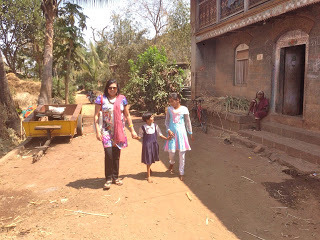
A favorite pasttime was strolling and chatting through several villages.
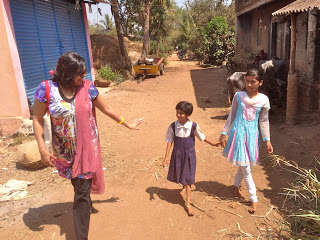
"Who was that strange auntie?"
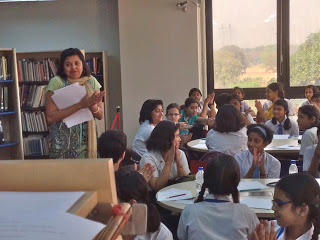
I offered a writing workshop at the U.S. Consulate's American
Center Library in Kolkata. Each student author was appropriately
applauded.
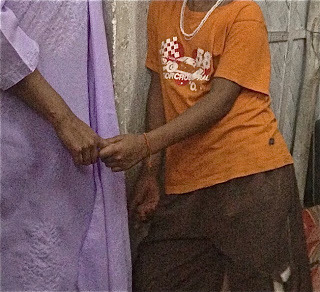
Also in
Kolkata, I talked with girls rescued from trafficking. Their stories are
beyond heartbreaking. Mahima Care Home provides hope and
restoration -- you can help or find out more .
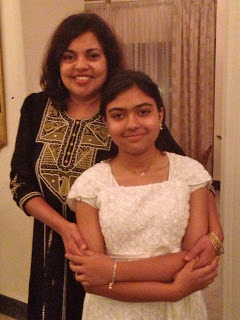
It was a joy to connect with the kids of my cousins. Those in classes 6, 8, 10, and 12 were in the throes of intensely competitive exams, but still took time to meet and honor their faraway relatives.
TIGER BOY Research

The U.S. Consulate allowed me to join the Consul General on a wonderful boat trip into the Sunderbans, an archipelago in a muddy, salty delta. This is the setting for TIGER BOY, a novel coming from Charlesbridge in 2014. The book is written, but I needed to verify details and add the grace notes for a sense of place. The Consulate's trip provided access to an array of experts, like the director and rangers who work for the Sunderbans Tiger Reserve , a visit to a small village hit hard by the cyclone, and a Q and A session with environmentalists from N.E.W.S. , who are striving to replant and protect the mangrove forests. I was so grateful for these opportunities!

Dozens of different kinds of boats traverse the waterways. As it was before the rains, the hues were green, brown, and grey.
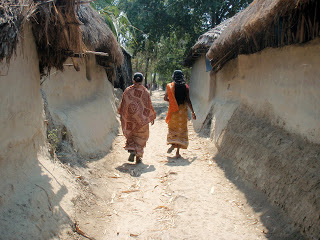
We discovered true beauty and resiliency in a Sunderbans village.
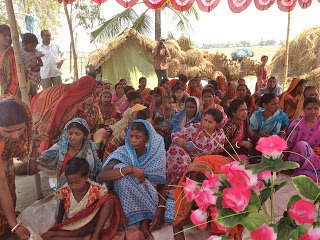
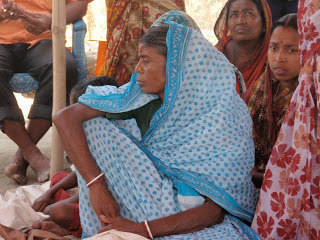
Women shared about replanting the mangrove forests to protect
their villages, and remembered the effects of Cyclone Alia, which
devastated the Sunderbans in 2009.
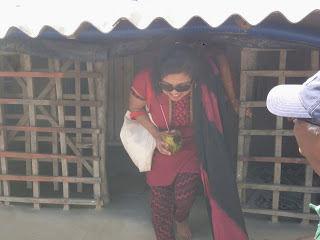
Hospitality abounded, even in homes hastily constructed after the cyclone.
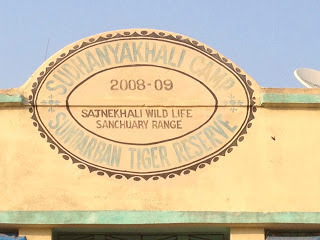
Next, we headed to the Tiger Reserve, which is made up of over 40 small islands. The Sunderbans are home to the only man-eating tigers in the world, and they can swim.

The only tiger we saw was a malnourished, injured creature caught by the rangers for treatment. The biggest danger faced by this beautiful creature is not the poacher, but the loss of the mangrove forest .

We did see fresh pug marks on the creek banks.

Mangrove roots seeking oxygen poke up through the mud, providing a vivid metaphor of how important our roots are to survival.

View from the tiger watchtower in the Reserve.
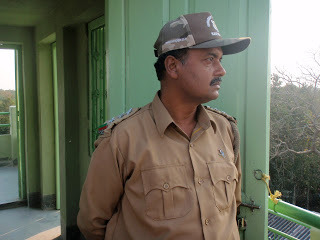
Jayant Basu, head ranger, was so helpful in discussing the details of my book. By the end of our time, he was proposing intricate plot twists.
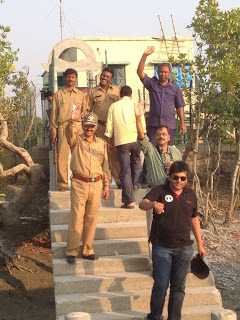
Serving as a ranger is a prestigious, dangerous position.
An Unexpected Encounter with Laura Ingalls Wilder
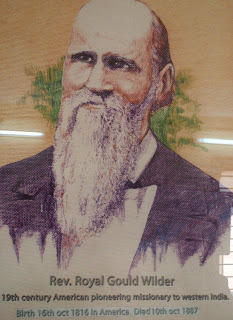
We visited a church in Maharashtra, and to my amazement, it was founded by Royal Wilder, uncle of Almanzo Wilder.
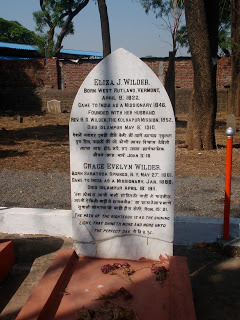
They proudly took us to visit the graves of Eliza Wilder, Royal Wilder's wife, and Grace Wilder, their daughter.
An amazing journey indeed. And what a difference to know the language! Mostly due to my parents, I was able to speak in Bangla during many of the conversations and understand more of the nuances and non-verbals than I had anticipated. Thanks to one and all who made this homecoming such a wondrous memory.
Come visit me on the Fire Escape!




My trip included an International Women's Day writing workshop with students in Kolkata at the U.S. Consulate's American Center Library , reunions with a myriad of extended family members and friends, a trip to the Sunderbans, site of my novel TIGER BOY (Charlesbridge 2014), and visits to two homes where young girls rescued from trafficking are given hope for a renewed future. For children's book aficionados, it also featured an unexpected encounter with Almanzo Wilder's uncle. If I had to sum it up, I'd say that two themes of the trip were conversations with girls and research for my novel.
Conversations with Girls

A favorite pasttime was strolling and chatting through several villages.

"Who was that strange auntie?"

I offered a writing workshop at the U.S. Consulate's American
Center Library in Kolkata. Each student author was appropriately
applauded.

Also in
Kolkata, I talked with girls rescued from trafficking. Their stories are
beyond heartbreaking. Mahima Care Home provides hope and
restoration -- you can help or find out more .

It was a joy to connect with the kids of my cousins. Those in classes 6, 8, 10, and 12 were in the throes of intensely competitive exams, but still took time to meet and honor their faraway relatives.
TIGER BOY Research

The U.S. Consulate allowed me to join the Consul General on a wonderful boat trip into the Sunderbans, an archipelago in a muddy, salty delta. This is the setting for TIGER BOY, a novel coming from Charlesbridge in 2014. The book is written, but I needed to verify details and add the grace notes for a sense of place. The Consulate's trip provided access to an array of experts, like the director and rangers who work for the Sunderbans Tiger Reserve , a visit to a small village hit hard by the cyclone, and a Q and A session with environmentalists from N.E.W.S. , who are striving to replant and protect the mangrove forests. I was so grateful for these opportunities!

Dozens of different kinds of boats traverse the waterways. As it was before the rains, the hues were green, brown, and grey.

We discovered true beauty and resiliency in a Sunderbans village.


Women shared about replanting the mangrove forests to protect
their villages, and remembered the effects of Cyclone Alia, which
devastated the Sunderbans in 2009.

Hospitality abounded, even in homes hastily constructed after the cyclone.

Next, we headed to the Tiger Reserve, which is made up of over 40 small islands. The Sunderbans are home to the only man-eating tigers in the world, and they can swim.

The only tiger we saw was a malnourished, injured creature caught by the rangers for treatment. The biggest danger faced by this beautiful creature is not the poacher, but the loss of the mangrove forest .

We did see fresh pug marks on the creek banks.

Mangrove roots seeking oxygen poke up through the mud, providing a vivid metaphor of how important our roots are to survival.

View from the tiger watchtower in the Reserve.

Jayant Basu, head ranger, was so helpful in discussing the details of my book. By the end of our time, he was proposing intricate plot twists.

Serving as a ranger is a prestigious, dangerous position.
An Unexpected Encounter with Laura Ingalls Wilder

We visited a church in Maharashtra, and to my amazement, it was founded by Royal Wilder, uncle of Almanzo Wilder.

They proudly took us to visit the graves of Eliza Wilder, Royal Wilder's wife, and Grace Wilder, their daughter.
An amazing journey indeed. And what a difference to know the language! Mostly due to my parents, I was able to speak in Bangla during many of the conversations and understand more of the nuances and non-verbals than I had anticipated. Thanks to one and all who made this homecoming such a wondrous memory.
Come visit me on the Fire Escape!




Published on March 14, 2013 09:52
February 5, 2013
Teaching Saint Mary's Students About The Power of Children's Books
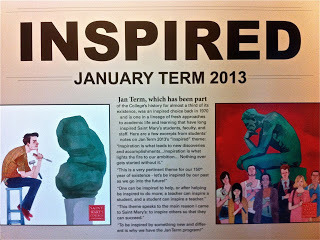
I've just finished a month of teaching "Race, Culture, and Power in Children's and YA Books" during Jan Term at Saint Mary's College of California . As the college-wide theme this year was Inspired (see above), I asked students to create picture books by fulfilling two requirements: (1) they were required to write fiction featuring a "hero's journey," and (2) they needed to explore an aspect of race, culture, or power.
I was delighted by their books, as well as their ability to debate issues around authenticity, banning, bowdlerization, ethnic awards, and multicultural representation on book covers. We also enjoyed eye-opening skype visits from Yolanda Leroy Scott of Charlesbridge , Renee Ting of Shen's Books , Debbie Reese of American Indians in Children's Literature , and Stacy L. Whitman of Tu Books . Thanks to all of these experts for their time and thoughtful input.
When asked about their takeaways from the class, here are a few student responses:
"I've developed a keen eye for exclusion."
"Never thought about white default before."
"Children's stories are powerful."
"Kids notice race at an early age."
"Stories featuring multicultural kids doing 'regular stuff' are empowering."
"There's power in being bicultural."
"It's hard to write a children’s story!"
Amen, right? Enjoy these photos of my beautiful students showing off their picture books:
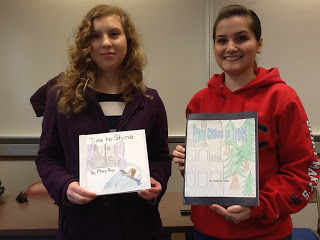
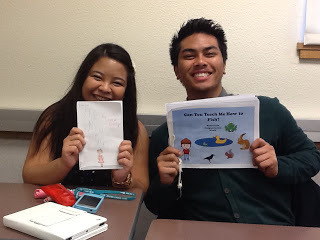
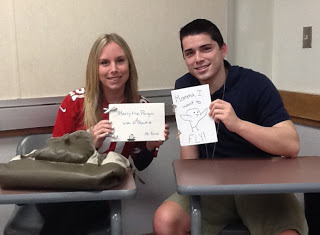
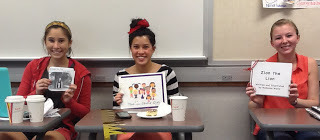
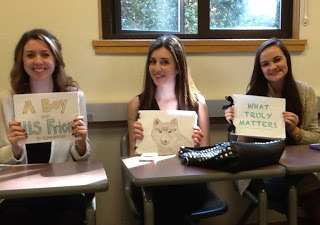
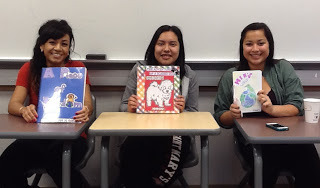
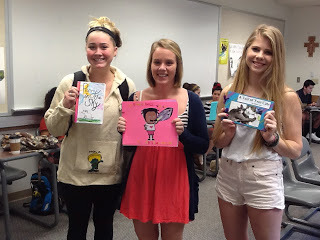
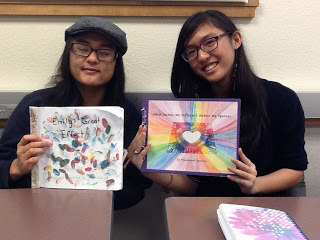
Come visit me on the Fire Escape!




Published on February 05, 2013 10:41
January 14, 2013
Children's/YA Book Awards: A Demographic Survey
Most of you know I'm teaching a Jan Term course called "Race, Culture, and Power in Children's/YA Stories" at Saint Mary's College in California. In class today students researched and compiled statistics about 12 children's/YA book awards (13 books) NOT restricted by the race of the author or illustrator. We included the National Book Award, Newbery, Caldecott, Printz, and other major awards.
GENDER: In 2012, 10 protagonists were male, while 4 were female (one book had two main characters). Meanwhile, 6 authors/illustrators were women (about half). So, to generalize, last year's award-winning books were mostly about boys, but created almost equally by men and women.
RACE: In 2012, 9 protagonists were white, while 4 protagonists were not (2 African American, 1 Middle Eastern, 1 Japanese). Meanwhile 10 authors/illustrators were white, while 3 were not (2 African American, 1 Middle Eastern). So, to generalize, last year's award-winning books were mostly about white people and created by white people.
Still, remember that according to the 2010 census, 63% of the US population is non-Hispanic white, 16% Latino/Hispanic, 12% Black, 6% Asian, and 3% more than one race.
Once again , we find a dearth of Latino/Hispanic main characters. Other thoughts?
Come visit me on the Fire Escape!




GENDER: In 2012, 10 protagonists were male, while 4 were female (one book had two main characters). Meanwhile, 6 authors/illustrators were women (about half). So, to generalize, last year's award-winning books were mostly about boys, but created almost equally by men and women.
RACE: In 2012, 9 protagonists were white, while 4 protagonists were not (2 African American, 1 Middle Eastern, 1 Japanese). Meanwhile 10 authors/illustrators were white, while 3 were not (2 African American, 1 Middle Eastern). So, to generalize, last year's award-winning books were mostly about white people and created by white people.
Still, remember that according to the 2010 census, 63% of the US population is non-Hispanic white, 16% Latino/Hispanic, 12% Black, 6% Asian, and 3% more than one race.
Once again , we find a dearth of Latino/Hispanic main characters. Other thoughts?
Come visit me on the Fire Escape!




Published on January 14, 2013 20:20
January 2, 2013
Race, Culture, and Power in Kid/YA Books
I'm heading west to teach a Jan Term course at
Saint Mary's College of California
called "Race, Culture, and Power in Children's and Young Adult Books." Here's the first part of my syllabus:
Why are children’s stories so powerful? Who has the right to tell stories about marginalized communities? This course will explore the question of authenticity in storytelling and unmask explicit and implicit messages about race, power, and culture communicated through books for young readers. A secondary course goal is to help students improve their analytical writing.
Part One: The Subversive Power of Children’s Stories
Part Two: Race in Children’s Stories
Part Three: Culture in Children’s Stories
Part Four: Power in Children’s Books
Alison Lurie, author of Don’t Tell The Grown-ups: The Subversive Power of Children’s Literature makes this argument about how children’s books can affect the common good:
On the flip side, children’s literature has also been a key part of state propaganda used by totalitarian and oppressive governments to impose certain social and moral codes on child readers. As Bruno Bettelheim argued in The Uses of Enchantment, stories told to children powerfully shape their moral world. Children with a well-developed sense of justice and compassionate hearts widened by stories can significantly serve the common good. Storytelling is a powerful act, especially when it involves young hearts and minds. From Uncle Tom's Cabin to Harry Potter, books can either repudiate or encourage stereotypes and injustice.
Students will explore and debate five questions:
(1) BOOK COVERS: Should young adult and middle grade novels depict faces on covers?
(2) BOOK AWARDS: Should ethnic book awards be based on the race/ethnicity of the author/illustrator?
(3) BANNING: Should certain children’s books be banned in homes and classrooms because of racism or cultural stereotyping?
(4) BOWDLERIZATION: Should we “bowdlerize” children’s classics that—seen with today’s eyes—are racist, or let them stand and be read as is?
(5) AUTHENTICITY: Should a story be told only by a cultural “insider” to guarantee authenticity?
This year I'm privileged to introduce my 26 students to Debbie Reese, who blogs at American Indians in Children's Literature , and Yolanda Leroy, editorial director of Charlesbridge , via Skype. Renee Ting, publisher of Shen's Books , will visit us in person. Since the theme of Jan Term 2013 is "inspiration," students will also be writing and creating picture books that explore a theme related to race, culture, or power. Come visit me on the Fire Escape!




Why are children’s stories so powerful? Who has the right to tell stories about marginalized communities? This course will explore the question of authenticity in storytelling and unmask explicit and implicit messages about race, power, and culture communicated through books for young readers. A secondary course goal is to help students improve their analytical writing.
Part One: The Subversive Power of Children’s Stories
Part Two: Race in Children’s Stories
Part Three: Culture in Children’s Stories
Part Four: Power in Children’s Books
Alison Lurie, author of Don’t Tell The Grown-ups: The Subversive Power of Children’s Literature makes this argument about how children’s books can affect the common good:
The great subversive works of children's literature suggest that there are other views of human life besides those of the shopping mall and the corporation. They mock current assumptions and express the imaginative, unconventional, noncommercial view of the world in its simplest and purest form. They appeal to the imaginative, questioning, rebellious child within all of us, renew our instinctive energy, and act as a force for change. This is why such literature is worthy of our attention and will endure long after more conventional tales have been forgotten.
On the flip side, children’s literature has also been a key part of state propaganda used by totalitarian and oppressive governments to impose certain social and moral codes on child readers. As Bruno Bettelheim argued in The Uses of Enchantment, stories told to children powerfully shape their moral world. Children with a well-developed sense of justice and compassionate hearts widened by stories can significantly serve the common good. Storytelling is a powerful act, especially when it involves young hearts and minds. From Uncle Tom's Cabin to Harry Potter, books can either repudiate or encourage stereotypes and injustice.
Students will explore and debate five questions:
(1) BOOK COVERS: Should young adult and middle grade novels depict faces on covers?
(2) BOOK AWARDS: Should ethnic book awards be based on the race/ethnicity of the author/illustrator?
(3) BANNING: Should certain children’s books be banned in homes and classrooms because of racism or cultural stereotyping?
(4) BOWDLERIZATION: Should we “bowdlerize” children’s classics that—seen with today’s eyes—are racist, or let them stand and be read as is?
(5) AUTHENTICITY: Should a story be told only by a cultural “insider” to guarantee authenticity?
This year I'm privileged to introduce my 26 students to Debbie Reese, who blogs at American Indians in Children's Literature , and Yolanda Leroy, editorial director of Charlesbridge , via Skype. Renee Ting, publisher of Shen's Books , will visit us in person. Since the theme of Jan Term 2013 is "inspiration," students will also be writing and creating picture books that explore a theme related to race, culture, or power. Come visit me on the Fire Escape!




Published on January 02, 2013 19:03
December 16, 2012
FIRST COMING by Madeleine L'Engle
My husband read this poem in church this morning, and it gave me great comfort in light of the recent events in Connecticut. I share it so that perhaps it may offer you, too, a ray of hope in the midst of this tragedy.
First Coming
By Madeleine L’Engle
He did not wait till the world was ready,
till men and nations were at peace
He came when the Heavens were unsteady
and prisoners cried out for release.
He did not wait for the perfect time.
He came when the need was deep and great.
He died with sinners in all their grime,
turned water into wine. He did not wait
till hearts were pure. In joy he came
to a tarnished world of sin and doubt.
To a world like ours, of anguished shame
He came, and his Light would not go out.
He came to a world which did not mesh,
to heal its tangles, shield its scorn.
In the mystery of the Word made Flesh
the Maker of the stars was born.
We cannot wait till the world is sane
to raise our songs with joyful voice,
for to share our grief, to touch our pain,
He came with Love: Rejoice! Rejoice!
From The Ordering of Love: The New and Collected Poems of Madeleine L'EngleCome visit me on the Fire Escape!




First Coming
By Madeleine L’Engle
He did not wait till the world was ready,
till men and nations were at peace
He came when the Heavens were unsteady
and prisoners cried out for release.
He did not wait for the perfect time.
He came when the need was deep and great.
He died with sinners in all their grime,
turned water into wine. He did not wait
till hearts were pure. In joy he came
to a tarnished world of sin and doubt.
To a world like ours, of anguished shame
He came, and his Light would not go out.
He came to a world which did not mesh,
to heal its tangles, shield its scorn.
In the mystery of the Word made Flesh
the Maker of the stars was born.
We cannot wait till the world is sane
to raise our songs with joyful voice,
for to share our grief, to touch our pain,
He came with Love: Rejoice! Rejoice!
From The Ordering of Love: The New and Collected Poems of Madeleine L'EngleCome visit me on the Fire Escape!




Published on December 16, 2012 10:52
November 28, 2012
I'm Finally A Girl Scout! (sort of)

One of the consequences of being an immigrant kid is missing out on some staples of an American childhood. My classmates would head off to something called "Girl Scouts," for example, and I had no clue what they were experiencing—until I read about the organization in a library book, of course. In fact, I acquired most of my cultural knowledge and fluency in Americana via my library card, but even books couldn't completely erase that left-out feeling. Maybe that's why I'm so thrilled to be featured as a Storyteller this month over at their Studio (in excellent company, by the way—browse the list of other authors). Thanks, Girl Scouts of the USA !Come visit me on the Fire Escape!




Published on November 28, 2012 14:46





